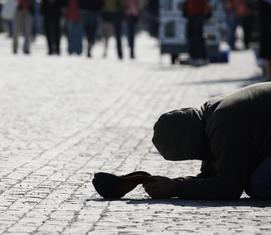The views expressed in our content reflect individual perspectives and do not represent the authoritative views of the Baha'i Faith.
Hidden within us is a living encyclopedia of all our ages and stages, including the entire cast of characters of everyone we have ever known, ever met, or even encountered in fiction.
It’s all inside, seeking order and coherence.
But we can be so committed to the observable world, to social justice, to freedom from prejudice, and the elimination of the extremes of wealth and poverty, that we can forget the sacred work associated with our inner selves. From a Baha’i perspective, though, Baha’u’llah calls individuals from all religious traditions to the work of inner unity:
How resplendent the luminaries of knowledge that shine in an atom, and how vast the oceans of wisdom that surge within a drop! To a supreme degree is this true of man, who, among all created things, hath been invested with the robe of such gifts, and hath been singled out for the glory of such distinction. For in him are potentially revealed all the attributes and names of God to a degree that no other created being hath excelled or surpassed. All these names and attributes are applicable to him. Even as He hath said: “Man is My mystery, and I am his mystery.” – Baha’u’llah, The Book of Certitude, p. 100.
The Baha’i teachings direct our attention to a soul-self entirely different from the body-identified ego-self. Lest we doubt the value of our soul-self, Baha’u’llah urges us all to “Turn thy sight unto thyself, that thou mayest find Me standing within thee mighty, powerful and self-subsisting.” – The Hidden Words, p. 7.
Today millions of people live in secular cultures that deny a conscious, benevolent source for human beings. If we are so persuaded, then it could be very difficult for us to believe that such a source would speak to us, let alone cherish us. But what if that spiritual source were to say something like this:
Out of the wastes of nothingness, with the clay of My command, I made thee to appear, and have ordained for thy training every atom in existence and the essence of all created things. – Ibid., p. 32.
Think of that: every atom in existence ordained by the Creator for the purpose of our education, as though the cosmos exists for each of us. What if the Creator could see the distinctions between us, and held a special regard for each one? What if that Creator wanted to give us its essence, and said something like:
Veiled in My immemorial being and in the ancient eternity of My essence, I knew My love for thee; therefore I created thee, have engraved on thee Mine image and revealed to thee My beauty. – Ibid., p. 4.
It’s much more empowering to claim a noble origin that an insignificant one. But even if we did come from a noble origin, our lives frequently pass through adversities and oppression that seem bent on our destruction. How should we deal with them? The Baha’i teachings offer answers to that dilemma.
The Existence of Oppression
If a benevolent, loving Creator wants our souls to grow and develop, then why doesn’t it just happen? Because the world contains experiences of oppression that press down on the soul and seem to work against the natural tendency of the soul to expand and develop, we often wonder about how to grow in spite of all that. Anticipating that life would encompass us with trials and tribulations, the Baha’i teachings tell us where to withdraw for safety:
Thou art My stronghold; enter therein that thou mayest abide in safety. My love is in thee, know it, that thou mayest find Me near unto thee. – Ibid., p. 6.
In all great romances, including that of the soul and its divine Beloved, the lover welcomes a means to prove their desire for the beloved—a quest, a great undertaking that will measure what the lover is willing to expend to be deserving of the presence of the Beloved. The Baha’i teachings prepare us for what will be required if we really wish to pursue the cause of inward unity, to prove our inner love for the Divine—if we want to rescue our original, noble self from the tragedies that have wounded it.
The Baha’i teachings acknowledge that this dreadful turn of events can befall any soul, and has throughout the course of history; but that God has not abandoned us, and will provide for our recovery:
And if thou art overtaken by affliction in My path, or degradation for My sake, be not thou troubled thereby. Rely upon God, thy God and the Lord of thy fathers … – Baha’u’llah, Baha’i Prayers, p. 210.
Displacing Oppression with Sovereignty and Dominion
The Baha’i teachings offer two concepts to counter oppression: sovereignty and dominion. Sovereignty refers to the inviolability of a soul’s boundaries and borders, while dominion refers to the soul’s exercise of self-determination over all of its properties, attributes, experiences and activities. With those spiritual qualities in place, even though oppression continues to operate in the world, it cannot crush us. Instead, the hidden benefits of trials and tribulation help build the exact inner strengths we must develop to bring back a healthy balance. Therefore, the wound brings knowledge of its own cure hidden within it:
My calamity is My providence, outwardly it is fire and vengeance, but inwardly it is light and mercy. Hasten thereunto that thou mayest become an eternal light and an immortal spirit. This is My command unto thee, do thou observe it. – Baha’u’llah, The Hidden Words, p. 15.
So it’s not the calamity that brings our innate strength forward, but the recovery process by which we transmute the aggressor’s energy into our own transformative power. What do we stand to gain? The quotation above says that this is the way for us to become an eternal light—to step beyond time and history into the realm of an immortal spirit.
More than merely eternal existence, the Baha’i teachings indicate that we can achieve a condition in which we can commune with that mysterious, conscious, benevolent source. We can rise to be near it if we can just trust it enough to lead us through these stages of development to our fulfil our destiny:
I desire communion with thee, but thou wouldst put no trust in Me. The sword of thy rebellion hath felled the tree of thy hope. At all times I am near unto thee, but thou art ever far from Me. Imperishable glory I have chosen for thee, yet boundless shame thou hast chosen for thyself. While there is yet time, return, and lose not thy chance. – Ibid., p. 29.
Living to Celebrate Excellence in All Things
Baha’i teachings on the work of the inner life resolve with the uplifting theme of excellence: excellence in our outer life, and excellence in our spiritual reality, too.
Baha’u’llah described that excellence as “the ascent to the throne of glory:”
Although at the beginning, this plane is the realm of conflict, yet it endeth in the ascent to the throne of glory … This is the plane of the soul who is pleasing unto God, wherefore He saith: “Enter thou among My servants, and enter thou My paradise. – Baha’u’llah, The Seven Valleys, newly translated edition, p. 88.
How do we create that splendor and excellence out of all things, including those that made us afraid, that hurt us, that tarnished and contaminated our sense of our own goodness?
As we enter into the higher planes of communion with God, we celebrate our own survival and elevation over those experiences. We get to see through them to the sustaining divine grace that was just behind those experiences of oppression and that brought us through. In this process we learn that recovery is a divine form of artistry, transmuting the raw material of memory into something that embodies and communicates significant positive meaning.
Anything ultimately beautiful starts with raw material, and the raw material of the soul is memory. When our memories are transmuted into glory and gratitude we are free:
Live then the days of thy life, that are less than a fleeting moment, with thy mind stainless, thy heart unsullied, thy thoughts pure, and thy nature sanctified, so that, free and content, thou mayest put away this mortal frame, and repair unto the mystic paradise and abide in the eternal kingdom for evermore. – Baha’u’llah, The Hidden Words, p. 37.
Having attained this unqualified victory, a new horizon opens for the soul on a higher level of being. It is invited to bring forth from itself some action to testify to its gratitude to the divine life force that brought it to ultimate victory: “To thank Him for this, make ye a mighty effort, and choose for yourselves a noble goal.” – Abdu’l-Baha, Selections from the Writings of Abdu’l-Baha, p. 35.

















Comments
Sign in or create an account
Continue with Facebookor